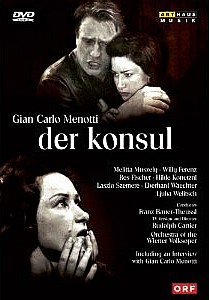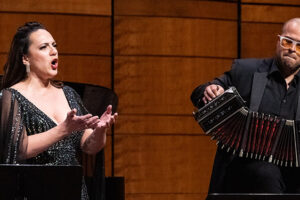
Arthaus Musik has released on DVD
a superb 1963 “Historical Studio Production” of Der Konsul, a German language filmed version of Menotti’s 1950 opera, The Consul. It is a dark, harrowing vision of Menotti’s “denunciation of all forms of tyranny”, beautifully sung, superbly acted, and directed with an almost film noir/expressionistic style by Rudolph Cartier.
Hearing an opera “somewhere in Europe” in a clearly totalitarian society sung in a European language adds an authenticity to its impact. Menotti’s music beautifully combines a Pucciniesque sweep, the dark undertones of Berg, and orchestral cacophony worthy of Strauss to paint a stark musical vision of freedom fighters dealing with a faceless bureaucracy.
The music is perfectly attuned to the emotional lives of its rich characters, particularly here under the baton of Franz Bauer-Theussl, who brings out every nuance in Menotti’s powerful score. Director Cartier brilliantly uses the rudimentary television techniques of the early 1960s to create a nightmarish world reminiscent of The Cabinet of Dr. Caligari.
Der Konsul takes place in the spare Sorel apartment, where resistance fighter John Sorel lives with his wife Magda, his mother, and his sickly baby. Sorel, hounded by the secret police, is leaving to head to safety in the mountains, leaving his wife Magda to try to get a visa to leave the country. The action moves to the office of Der Konsul, where desperate men and women are forced to fill out endless paperwork with the slim hope of getting a visa. The consul’s Secretary is the utter symbol of mindless bureaucracy, serving Der Konsul, who is never seen or heard behind his closed door.
Director Cartier keeps an almost unbearable tension throughout as the desperate Magda tries to find a way to save her husband. The only misstep (Menotti’s or Cartier’s?) is the Magician scene, where Menotti seems to be trying to lighten the proceedings with a buffo moment when the magician/hypnotist tries to make a case for a visa based on his artistry alone. Befuddling the Secretary with magic tricks, he hypnotizes the entire room, getting all the visa applicants to dance. The whole scene feels like we’ve entered a different opera, and interrupts the dramatic flow.
The cast is uniformly excellent. Melitta Muszely, a singer unknown to me until this performance, is the profound heart and soul of this production. Her soprano soars easily and with tremendous vocal variety through Magda’s increasing terrors. She is a film actress of real finesse, wonderfully expressive even in close-up. She handles the famous aria and scene we know as “To this we’ve come” with power, grace, and smoldering intensity.
She is matched by the young Eberhard Waechter as John, passionate and equally skilled at the cinematic style. Another discovery for me was the German contralto Res Fischer as John’s mother, a deeply felt performance, so expressive of the suffering of the old in a society without peace. Her Act Two lullaby to the Sorel’s dying child, “Bringen werd ich dir Sonn und Mond” was sung with overwhelming love and longing. It is a stunning moment.
American mezzo Gloria Lane is excellent as The Secretary, handing out her endless forms and papers behind sunglasses, that her character can hide her eyes and any emotion she feels from the pitiable applicants. When she finally removes the sunglasses as she closes the office, we are allowed to see her own frustrations in the moving “Oh, diese Gesichter”. Lane’s juicy mezzo and stiff-spined demeanor create just the right bureaucratic emptiness.
In luxury casting, we have Ljuba Welitsch as the Italian Woman, touching in her need to find her dying daughter. Willy Ferenz is appropriately chilling as the Secret Police Agent.
Menotti’s ability to combine the personal with the political in this masterwork is breathtaking. There is an immediacy to the issues and characters in this work, belying the more than half century since its Philadelphia debut in 1950. It is no surprise that The Consul ran for 269 performances on Broadway thereafter. The only surprise is that this opera is not performed more today.
This extraordinary studio performance is one to savor. Also included is a brief interview with Menotti from German television. But watchers will find themselves unable to turn away from the voice of Muszely’s Magda or the layers of thought and emotion in her hypnotic eyes. This opera and this performance are glorious examples of 20th century music drama.
























Comments